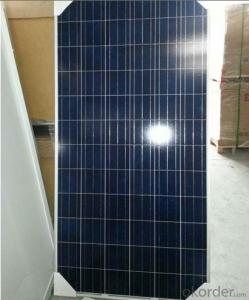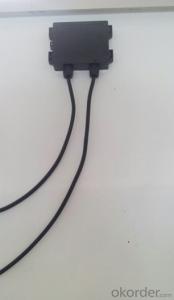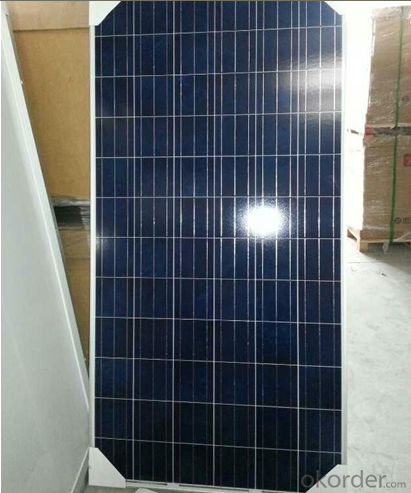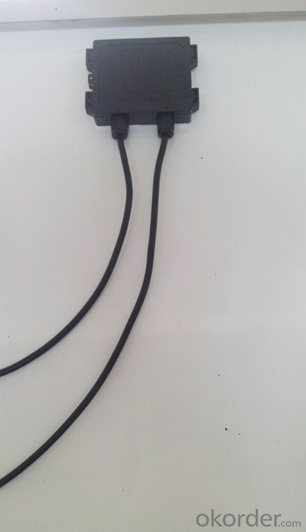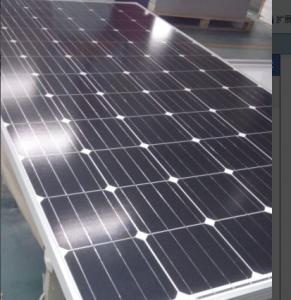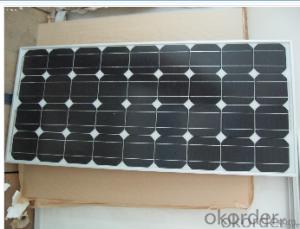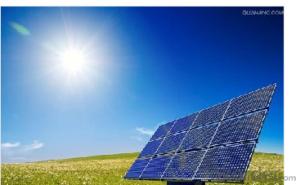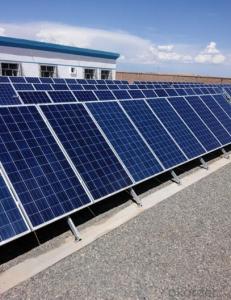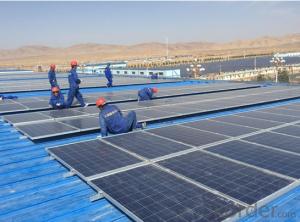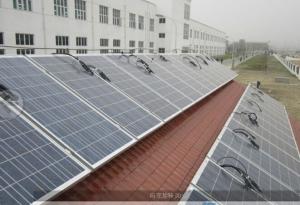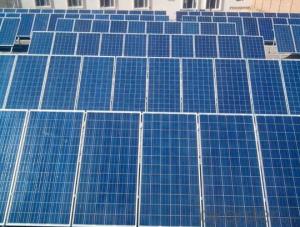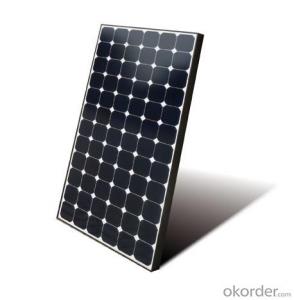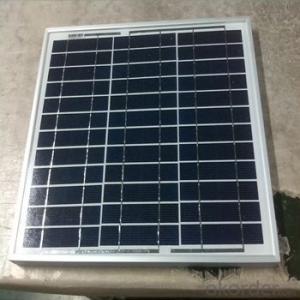10KW Poly Silicon Solar Module / 10KWatt Solar Panel with Outlet CNBM - 285W
- Loading Port:
- Qingdao
- Payment Terms:
- TT OR LC
- Min Order Qty:
- 10 set
- Supply Capability:
- 300000 set/month
OKorder Service Pledge
OKorder Financial Service
You Might Also Like
Quick Details
| Place of Origin: | China (Mainland) | Brand Name: | CNBM | Model Number: | 285W solar module |
| Material: | Polycrystalline Silicon | Size: | 1956*992*50mm | Number of Cells: | 72 |
| Max. Power: | 285W | Cell Size(mm): | 156*156 | Tolerance: | 0~3% |
| Cells Number(pcs): | 6*12 | Weight(Kg): | 25 | Max.Series Fuse Rating (A): | 15 |
| Max.System Voltage-IEC(V): | 1000 |
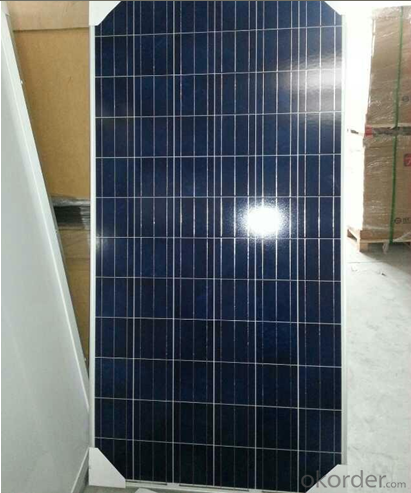
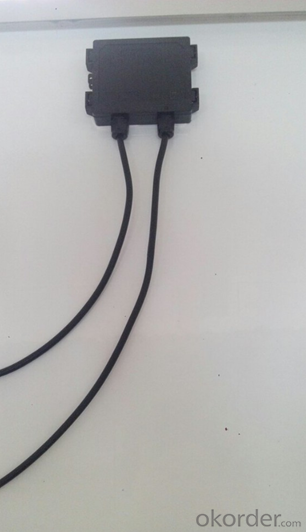
Polycrystalline Solar Module
XH250P(72)/ XH275P(72)/ XH300P(72)
Models | XH250P(72) | XH285P(72) | XH300P(72) |
Max. Power (Pmax) | 250Wp | 285Wp | 300Wp |
Optimum Operating Voltage (Vm) | 34.8V | 35.7V | 35.9V |
Optimum Operating Current (Im) | 7.18A | 7.77 A | 8.08A |
Open-circuit Voltage (Voc) | 43.8V | 35.4 V | 44.4V |
Short-circuit Current (Isc) | 8.04A | 8.24 A | 8.62A |
Cells efficiency | 14.6% | 15.8% | 16.8% |
Dimension L×W×H (mm) | 1956×992×50mm | 1956×992×50 | 1956×992×50 |
Power Tolerance (Pmax) | 0 ~ +3% | 0 ~ +3% | 0 ~ +3% |
Numbers of cells | 60pcs poly solar cell 156×156mm | 72pcs poly solar cell 156×156mm | 72pcs poly solar cell 156×156mm |
weight | 25kg | 25kg | 25kg |
Max system voltage | 1000V DC | 1000V DC | 1000V DC |
Temperature cycling range | -40℃ ~ +85℃ | -40℃ ~ +85℃ | -40℃ ~ +85℃ |
- Q: Can solar panels be installed on a residential community or housing development?
- Yes, solar panels can be installed on a residential community or housing development. In fact, many residential communities and housing developments are incorporating solar panels as a sustainable and cost-effective energy solution. Installing solar panels on rooftops or open spaces within the community can generate clean energy, reduce electricity bills, and contribute to a greener environment.
- Q: Are solar panels safe?
- Yes, solar panels are safe. They are designed and installed with safety measures in place to ensure their proper functioning and to minimize any potential risks.
- Q: How do solar panels affect the property's community image?
- Solar panels can have a positive impact on a property's community image by showcasing a commitment to sustainability and renewable energy. They can enhance the property's reputation as an environmentally conscious and forward-thinking community, leading to increased respect and admiration from residents and neighbors. Additionally, solar panels can act as a visual symbol of progress and innovation, contributing to a positive perception of the property and potentially attracting like-minded individuals or businesses to the community.
- Q: i was told that by making a solar panel they cause more pollution than they will end up getting rid of. Is that true?
- It depends on what type of pollution you are talking about. Some of the newer cells that don't use silicone are made with dangerous chemicals that are just dumped into the local water supply when made in China or other places with no real environmental controls. No matter how much carbon free energy the cells produce they will never clean up the mess people made when building them.
- Q: Do solar panels require direct sunlight to generate electricity?
- No, solar panels do not require direct sunlight to generate electricity. They can still generate power even in cloudy or overcast conditions, although the amount of electricity produced may be reduced.
- Q: How do solar panels affect roof ventilation?
- Solar panels can have both positive and negative effects on roof ventilation. On one hand, solar panels can provide shade to the roof, reducing heat absorption and helping to keep the attic space cooler. This can decrease the need for excessive ventilation and potentially lead to energy savings. However, solar panels can also obstruct the airflow on the roof, limiting the natural ventilation and potentially causing heat buildup. Therefore, it is important to consider the design and placement of solar panels to ensure proper roof ventilation is maintained.
- Q: Tell me complete installation I have one 50Ah battery two 80 watts solar panels about 30 meter DC wire i charge ontroller and 000watt inverter. How i hook two solar panels to charge controller to battery then inverter?
- Wires from panels go to controller input terminals. Controller DC battery terminals to battery so that the controller will protect batteries and split power as required by demand to the inverter. Output DC on controller to inverter. Output AC or outlets on the inverter to AC appliances. One thousand watts is not very much capacity. It will keep your computer running and a lamp to read by. It won't run major appliances. A hair dryer is typically 500 watts and could not be run by this system.
- Q: Can solar panels be installed on a hotel or hospitality establishment?
- Yes, solar panels can be installed on a hotel or hospitality establishment. In fact, many hotels and hospitality establishments are increasingly adopting solar energy systems to reduce their reliance on traditional energy sources and decrease their carbon footprint. Installing solar panels on these establishments can help generate clean and renewable energy, lower energy costs, and showcase their commitment to sustainability.
- Q: Can solar panels be installed on a residential community?
- Yes, solar panels can be installed on a residential community. Many residential communities have implemented solar panel systems to generate clean and renewable energy for homes. These installations can help reduce electricity costs, decrease reliance on fossil fuels, and contribute to a more sustainable living environment.
- Q: are there solar panel that work without the sun?
- No. Solar panels require light to work. The closest type of passive energy collecting device is a thermocouple, which generates electricity via a temperature differential. But it requires a cold and hot source to operate, while a solar panel only requires light. Good luck!
Send your message to us
10KW Poly Silicon Solar Module / 10KWatt Solar Panel with Outlet CNBM - 285W
- Loading Port:
- Qingdao
- Payment Terms:
- TT OR LC
- Min Order Qty:
- 10 set
- Supply Capability:
- 300000 set/month
OKorder Service Pledge
OKorder Financial Service
Similar products
Hot products
Hot Searches
Related keywords
